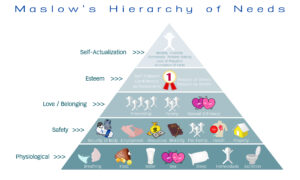Objectives
- Providing yourself with cues of safety is essential to healing. However, your body instinctively gravitates towards being aware of threats.
- Even when life is good, your brain is constantly scanning your surroundings (including your consciousness) for danger. It is your “personal brain scanner.”
- As disruptive as anxiety is, it is your protector and gift of life. You are not going to get rid of it or transform it into a pleasant sensation.
- Efficiently dealing with it daily allows you to nurture joy and live the life you wish.
Abraham Maslow was a prominent psychiatrist who looked at the human condition in terms of the hierarchy of needs.1 At the base of it were basic physiological needs such as food, air, clothes, water, heat , sleep, sexual intercourse, light, hygiene, shelter, urination, and excretion. Without these basics being met, it is unlikely we can or will pursue the higher levels of needs with the top being self-actualization.

What he didn’t mention was that “not being in pain – mental or physical” is not only a foundational need but it is a driving force for most human behavior. People will do almost anything not to feel anxious and vulnerable. It is bi-directional in that lack of the above-mentioned resources will clearly create anxiety and meeting those needs will help lower it. I again want to acknowledge the depth of suffering that occurs in this scenario, and it is almost impossible to pursue a healing journey under severe adversity.
Stress = threat
However, if these needs are being met, then stress (threat) is not the problem. It is the reaction to it that creates so much chaos within you. Avoiding stress doesn’t work and becomes its own stressor. Remember the most impactful stresses are the ones you cannot control. So, that is why learning how to lower your threat physiology through the different portals is so critical.

The metaphor of a bathroom is relevant because you cannot get rid of anxiety and survive. It is part of everyday life. It is important to develop a “working relationship” with it and let it do its work. So, it is a matter of processing life every day, dealing with the waste, and visiting this room as many times as you need to. If your stress reactions build up without an outlet, you will eventually become ill.2
As you learn to develop this relationship with these emotions as opposed to fighting them, you’ll become more skilled in processing them, and your reactions will become fewer and less intense. There are three aspects of lowering this neurochemical inflammatory reaction.
- Separate your identity from this response. It is what you possess, not who you are! It is also universal and there is no reason to take anxiety personally.
- You can directly lower these hormones and inflammatory markers with tools such as humming, breath work, nasal breathing, and calming sounds.
- By stimulating neuroplastic changes in your nervous system, your automatic reactions are less disruptive, and the real healing comes from the creation of new circuits that are pleasurable and creative. There are infinite possibilities and the metaphor of building your new home is a foundational framework.
Emotional flexibility
One solution to dealing with anxiety is control. It is what this sensation is intended to do – be so unpleasant so as to compel you to solve threats – and it works. You are alive and reading this lesson. However, since mental and physical threats are processed in a similar manner, and humans can’t escape their consciousness, we are all trapped by our thoughts to a greater or lesser degree.3 Most of us instinctively fight disruptive thoughts and feelings, but this only reinforces them.
The other strategy, which is actually fairly effective is mental and emotional rigidity. If you train your mind to focus and become immersed in any number of belief systems, your mind is occupied, and unpleasant thoughts are largely “pushed aside.” The beliefs can take any number of different forms such as religion, politics, strong opinions about morality and people who are different than you. What is problematic is that humans are programmed by their own lives and infinitely unique. None of us see anything exactly the same way – even solid objects. Rigid thinking works quite well for decreasing anxiety for the person, but not for those around him or her. You have lost awareness of the needs of others and pigeon-holed them into your way of thinking.
One definitive solution for anxiety is giving up the need for control. In other words, you must learn that anxiety protects you, and is the gift of life. It is also why you have to separate your personal identity from this reaction and develop a “working relationship” with it. It is never going to be a pleasant sensation, but as you become more “emotionally flexible” you’ll learn to tolerate, even become comfortable with it. It needs to be processed daily, all day long.
Emotional perfectionism is a problem. You monitor your progress, feel like you have” failed” if you dive back into being anxious or angry, and your self-critical voices start talking to you. You are now a victim of these thoughts (and you really are), and you are not going to outrun them. Even if you can for a while, they are relentless and will wear you down.

Recap
Anxiety is a physiological state. Glance though the lessons in Leg 3 of this course. It is challenging to deeply change your concepts of anxiety. Most of us are raised to feel that this is a psychological issue and if you are overwhelmed by it, you are not tough enough. “If you can’t take the heat, get out of the kitchen.”
Nothing could be further from the truth. Suppressed anxiety is a disaster, causes damage to the memory center of your brain,4 and disrupts every aspect of your life. You are so used to doing it (who taught you otherwise), you may have no idea that this is what you are doing. Being “tough” was at the core of my own descent into The Abyss.
The main focus of The DOC Journey is learning ways to methodically become aware of and process anxiety and anger so you can live a life that reflects who you really are. To have a good life, you have to live a good life. However, this also requires learning how to efficiently separate from and deal with your survival reactions. Being anxious or angry isn’t good or bad. It is life.
Questions and Considerations
- Emotional pain hurts. Why would we want to feel that pain? We don’t. However, learning to live with it is essential to healing.
- Anger effectively covers up feeling vulnerable, which we instinctively dislike. No one EVER wants to give it up, and we can’t. It is another factor in becoming emotionally flexible.
- It is difficult to understand the necessity of anxiety and anger and also be aware of its impact on you and your life. These emotions preclude awareness and the reason why specific skills are required to break through this catch-22.
- De-personalize these sensations and develop skills to deal with them. You must let go to move forward.
References
- Miles Vich. Maslow’s leadership legacy. Journal of Humanistic Psychology (2008); 48: 444–445.
- Smyth J, et al. Stress and disease: A structural and functional analysis. Social and Personality Psychology Compass (2013); 7:217-227. doi:10.1111/spc.12020
- Eisenberger NI, et al. An experimental study of shared sensitivity to physical pain and social rejection. Pain (2006); 126:132-138. doi:10.1016/j.pain.2006.06.024.
- Hulbert JC, et al. Inducing amnesia through systemic suppression. Nature Communications (2015); 7:11003. doi: 10:1038/ncomms11003
